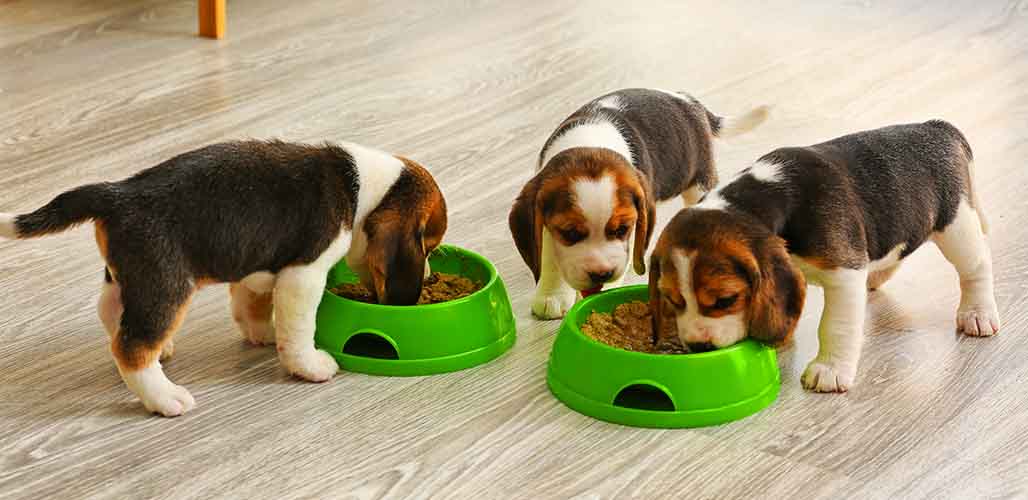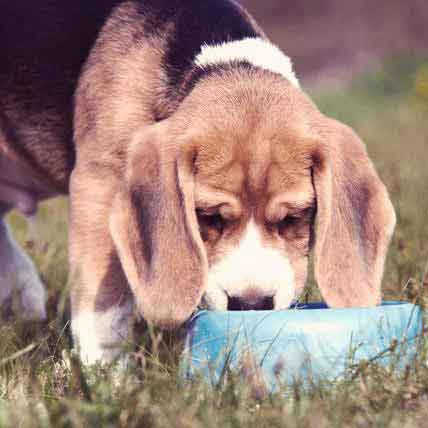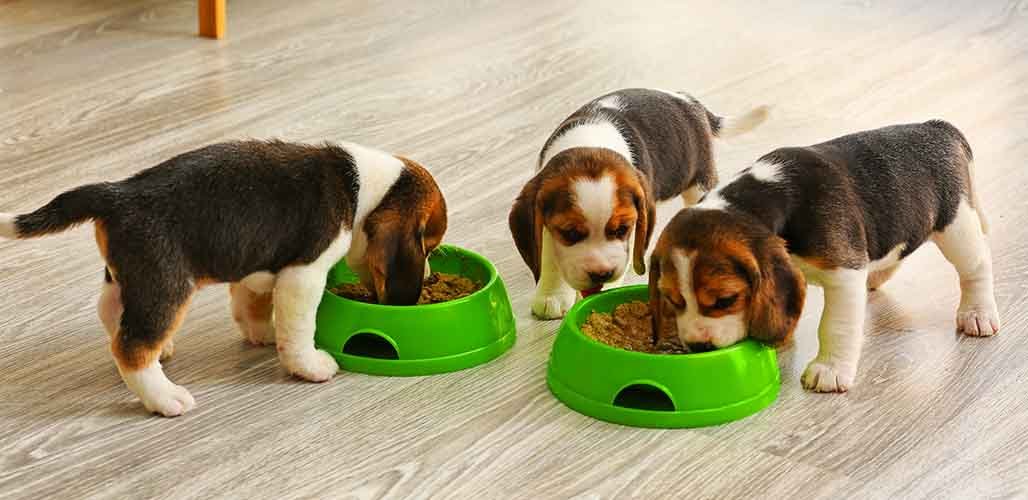When it comes to feeding a beagle, it’s important to understand their unique dietary needs. Did you know that beagles have a tendency to overeat? This can lead to obesity and other health issues. So, how can you feed a beagle in a way that keeps them healthy and satisfied?
Beagles have a history of being hunting dogs, known for their keen sense of smell and boundless energy. This means that they require a balanced diet with the right combination of protein, carbohydrates, and fats to support their active lifestyle. A beagle’s diet should primarily consist of high-quality dog food that is specifically formulated for their breed. Additionally, it’s important to monitor their food intake and avoid overfeeding. By establishing a feeding schedule and portion control, you can help prevent obesity and maintain your beagle’s overall health and wellbeing.
A beagle can be fed a balanced diet consisting of high-quality dog food formulated for their specific nutritional needs. It’s important to choose a food that is appropriate for their age, size, and activity level. Beagles are prone to obesity, so portion control is key. It’s also a good idea to consult with a veterinarian for specific dietary recommendations. Proper nutrition is essential for the overall health and well-being of your beagle.

Feeding Your Beagle: What You Need to Know
Feeding your Beagle is an important aspect of responsible pet ownership. As a dog owner, it’s crucial to provide your Beagle with a balanced and nutritious diet to ensure their overall health and well-being. In this article, we will explore the topic of feeding Beagles, answering the question: can you feed Beagle? Let’s dive in and discover more!
Understanding Your Beagle’s Nutritional Needs
Beagles, like any other dog breed, have specific nutritional requirements that need to be met through their diet. It’s important to understand these needs to ensure that your Beagle receives the right balance of nutrients.
Beagles are active dogs that require a diet that is rich in protein, as it helps support their muscle development and energy levels. They also need a sufficient amount of carbohydrates for energy, and healthy fats for a shiny coat and healthy skin.
In addition to macronutrients, Beagles also need essential vitamins and minerals, such as vitamins A, D, E, and calcium, to support their overall health and strong bones.
Choosing the Right Food for Your Beagle
When it comes to feeding your Beagle, it’s essential to choose a high-quality dog food that meets their nutritional requirements. Look for a dog food that is specifically formulated for Beagles or small to medium-sized breeds.
Read the ingredient list on the dog food packaging and opt for options that contain real meat as the primary ingredient. Avoid foods that are high in fillers, by-products, and artificial ingredients, as they offer little nutritional value to your Beagle.
It’s important to note that every dog is different, and their dietary needs may vary. Consult with your veterinarian to determine the best type of food, as well as the appropriate portion size, for your Beagle based on their age, weight, and activity level.
Establishing a Feeding Schedule
Once you have selected the right food for your Beagle, it’s important to establish a consistent feeding schedule. Beagles thrive on routine, so feeding them at the same time every day can help regulate their digestion and prevent overeating.
Divide your Beagle’s daily portion into two meals, one in the morning and one in the evening. This will help prevent them from becoming too hungry or too full throughout the day.
It’s also important to provide your Beagle with access to fresh water at all times. Hydration is key to their overall health and well-being.
Avoiding Common Feeding Issues
While Beagles are generally good eaters, they can be prone to overeating, which can lead to weight gain and health issues such as obesity. It’s important to monitor your Beagle’s weight and adjust their portion sizes accordingly.
Avoid feeding your Beagle table scraps or human food, as these can be high in calories and unhealthy for them. Stick to their balanced dog food and consult with your veterinarian before making any changes to their diet.
Additionally, be mindful of any food allergies or sensitivities your Beagle may have. Common allergens for dogs include wheat, soy, and certain proteins. If you suspect that your Beagle has a food allergy, consult with your veterinarian for guidance on selecting an appropriate diet.
The Importance of Regular Veterinary Check-ups
Regular visits to the veterinarian are crucial for your Beagle’s overall health, including their nutritional needs. Your veterinarian will be able to assess your Beagle’s weight, body condition, and make any necessary adjustments to their diet.
They can also provide recommendations for supplements or specific dietary plans if your Beagle has any health conditions that require special attention.
Can You Feed Beagle Human Food?
While it may be tempting to share your meals with your Beagle, it’s generally not recommended to feed them human food. Many human foods are not suitable for dogs and can cause digestive issues, nutrient imbalances, or even toxicity.
However, there are some human foods that can be given as occasional treats in moderation. These include lean meats (such as chicken or turkey), plain cooked vegetables (such as carrots or green beans), and fruits (such as apple slices or blueberries). It’s important to consult with your veterinarian before introducing any new foods into your Beagle’s diet.
Remember, treats should never make up more than 10% of your Beagle’s daily caloric intake, as excessive treats can lead to weight gain and other health issues.
Conclusion
Feeding your Beagle a balanced and nutritious diet is essential for their overall health and well-being. Understanding their nutritional needs, selecting the right dog food, establishing a feeding schedule, and avoiding common feeding issues are key aspects of responsible pet ownership. Remember to consult with your veterinarian for personalized recommendations and guidance. By prioritizing your Beagle’s nutrition, you can help them live a happy and healthy life!
Key Takeaways
- Beagles have specific dietary requirements that need to be met.
- A balanced diet for a beagle should include high-quality protein, vegetables, and grains.
- Beagles have a tendency to overeat, so portion control is important.
- It’s important to avoid feeding beagles foods that are toxic to dogs, such as chocolate, grapes, and onions.
- Consulting with a veterinarian is the best way to ensure your beagle is getting the right nutrition.
Frequently Asked Questions
In this section, we address some commonly asked questions about feeding beagles.
1. What should I feed my beagle?
When it comes to feeding your beagle, it’s important to provide a balanced and nutritious diet. High-quality dry kibble specifically formulated for dogs is a good option. Look for a brand that contains real meat as the main ingredient and avoid those with excessive fillers and artificial additives. Additionally, you can incorporate fresh fruits, vegetables, and lean meats into your beagle’s diet as occasional treats. Remember to consult with your veterinarian to determine the appropriate portion sizes and feeding schedule for your beagle’s specific needs.
It’s essential to ensure your beagle has access to fresh, clean water at all times. Avoid feeding your beagle human food that may be toxic to dogs, such as chocolate, onions, grapes, and avocados.
2. How often should I feed my beagle?
Beagles have a tendency to overeat and become overweight, so it’s important to establish a regular feeding schedule. Typically, adult beagles should be fed twice a day, once in the morning and once in the evening. Puppies may require more frequent feedings, usually 3 to 4 times a day, until they reach maturity. By feeding your beagle at consistent times, you can help regulate their appetite and prevent excessive weight gain.
Monitor your beagle’s weight and body condition regularly and adjust their portion sizes accordingly. If you have concerns about your beagle’s weight or feeding habits, consult with your veterinarian for guidance.
3. Can I give table scraps to my beagle?
While it may be tempting to share table scraps with your beagle, it’s generally not recommended. Human food can be high in calories, fat, and sodium, which can contribute to weight gain and health issues in dogs. Additionally, certain foods that are safe for humans can be toxic to dogs. It’s best to stick to a balanced and nutritionally complete dog food diet and use appropriate dog treats as rewards or occasional treats.
If you are unsure about whether a particular food is safe for your beagle, consult with your veterinarian before sharing it with them.
4. Can I feed my beagle a raw diet?
Feeding a raw diet, also known as a raw food or BARF diet, to your beagle is a personal choice. However, it’s important to approach it with caution. A raw diet consists of uncooked meat, bones, fruits, and vegetables. While some proponents of raw diets claim they offer health benefits, there are also potential risks associated with feeding raw food, such as bacterial contamination and nutrient imbalances.
If you choose to feed your beagle a raw diet, it’s crucial to do thorough research, consult with a veterinarian or canine nutritionist, and follow proper food handling and safety practices to ensure your beagle’s health and well-being.
5. Are there any specific foods I should avoid feeding my beagle?
There are certain foods that can be harmful or toxic to beagles and should be avoided. These include chocolate, onions, garlic, grapes, raisins, avocados, alcohol, caffeine, and anything containing xylitol, a common sweetener found in many sugar-free products. Additionally, be careful with foods that have small bones or are choking hazards, such as chicken bones or popcorn.
It’s always best to consult with your veterinarian if you have any specific concerns about the foods you are feeding your beagle to ensure their safety and well-being.

Complete Beagle Feeding Guide (Puppies to adult beagles) | What To Feed | How Much to Feed
To keep your beagle healthy, it’s important to feed them a balanced diet that meets their nutritional needs. Beagles require a high-quality dog food that provides the right balance of protein, carbohydrates, fats, vitamins, and minerals.
It’s best to choose a dog food that is specifically formulated for small to medium-sized breeds. Beagles are prone to obesity, so it’s important to monitor their calorie intake and avoid overfeeding. Additionally, beagles have sensitive stomachs, so it’s important to avoid feeding them foods that can cause digestive issues, such as fatty or spicy foods.
Lastly, always make sure that fresh water is readily available for your beagle to drink throughout the day. By providing them with a nutritious diet and plenty of clean water, you can help your beagle live a happy and healthy life.
